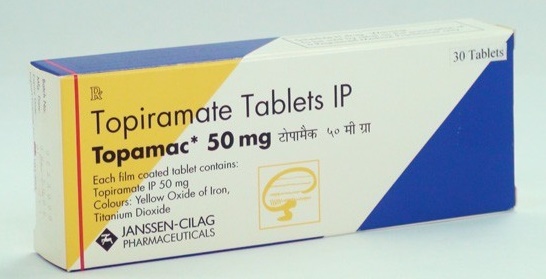Topamac (Topiramate)
Informations
Prescribed for the control of seizures, Topamac is an anticonvulsant medication prescribed for adults and children who are older than 2 years of age or older. Topamac is also prescribed for the prevention of migraine headaches.
Topiramate prevents or reduces the number of seizures experience by reducing abnormal electrical signals in the brain. When used for migraines, topiramate calms the nerve cells in the brain to prevent the headaches.
Warnings
When using Topamac it is important for you to follow all of your doctor's instruction. Do not exceed the dosage prescribed and take the medication for the entire time prescribed by your doctor. You may experience symptom relief before the prescription is complete, continue taking the medication anyway.
Read the patient medication leaflet enclosed with this medication for use and safety information.
Before taking Topamac tell your doctor if you are allergic to it or any of its ingredients or any other anticonvulsant medications. Also tell your doctor if you have kidney disease, glaucoma, osteoporosis, asthma, depression, suicidal thoughts, liver disease or metabolic acidosis. Tell your doctor if you experience mood changes, agitation, or hostility. Get immediate medical attention if you have vision changes or pain behind or around the eyes, as these may be early symptoms of permanent damage to your visions.
While taking Topamac, oral contraceptives may lose effectiveness. Use an alternative form of birth control while taking Topamac.
Topiramate is categorized as a pregnancy category D medication. Topiramate is known to cause birth defects in unborn babies such cleft lip or palate. Immediately inform your doctor if you become pregnant while taking Topamac. Do not breast feed if you are taking Topamac, topiramate can pass through breast milk to a nursing baby and may cause harm.
Avoid activities that require clear vision or quick thinking while taking Topamac until you know how it affects you.
Topiramate may increase the chance of developing kidney stones, especially for children following a ketogenic diet.
Drink plenty of water while taking Topamac. This will help to reduce the chance of dehydration, electrolyte imbalance, and the formation of kidney stones.
If you forget to take Topamac take it as soon as you remember if it is less than six hours since the missed dose. If it is close to the time for the next dose, wait and take that dose. Do not take an extra dose to make up for a missed one.
Get immediate medical attention if you accidentally take an overdose of Topamac. Symptoms of an overdose include:
- Agitation
- Blurred vision
- Chest pain
- Depression,
- Drowsiness
- Fainting
- Giddiness
- Seizures
- Shortness of breath
- Stomach pain
Topamac should be stored in a cool dry location out of the reach of children and pets.
How to use
The dosage of Topamac is based on factors such as age, gender, medical condition, and other medications you take. Use Topamac as prescribed by your doctor. You should not stop taking it or change the dosage without your doctor's approval. Take medication for the entire time prescribed by your doctor even if your symptoms have subsided or have disappeared.
Topamac whole tablets should be taken with a full glass of water, with or without food at the same time each day to maintain an even level of medication in your system. Do not break, chew, or crush the tablets.
Topamac is usually taken twice a day however your dosage may be different depending on factors unique only to you.
Drink plenty of water while taking Topamac. This will help to reduce the chance of dehydration, electrolyte imbalance, and the formation of kidney stones.
Possible Side Effects
Some users may experience side effects when topiramate is taken. It is important that you are aware of possible side effects and what to do if you experience any of them. Not all users will experience a side effect.
Possible common side effects:
- Abdominal pain
- Anxiety
- Back pain
- Changes in gait
- Changes in sense of touch
- Diarrhea
- Difficulty speaking
- Dry mouth
- Impotence
- Indigestion
- Injury
- Insomnia
- Joint pain
- Memory loss
- Mood changes
- Sinus infection or irritation
- Sore throat
- Viral infections
- Weakness
Drug Interaction
As with most medications, there is a chance of experiencing a drug interaction when taking Topamac. Discuss with your doctor what medications you are taking to avoid a drug interaction; this includes prescriptions and over-the-counter medications, vitamins, and herbal remedies. Never start a new medication without approval from your doctor.
Types of medications that are likely to interact with topiramate causing excessive drowsiness include muscle relaxants, sedatives, narcotic pain medications, allergy medications, sleeping pills, and anti-depressants. Tell your doctor if you take any type of these medications before taking Topamac.
Do not take Topamac with any of the following medications without your doctor's approval:
- Acetazolamide
- Anti-seizure drugs
- Atropine
- Belladonna
- Benztropine
- Carbamazepine
- Darifenacin
- Hydrochlorothiazide
- Ipratropium
- Lithium
- Metformin
- Phenytoin
- Solifenacin
- Valproic acid
Your doctor or pharmacist can provide a complete list of drugs and medications that should be avoided while using Topamac.





0 comments:
Post a Comment